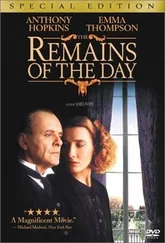“You never had a collection after Hailsham, did you?”
Ruth, who was sitting up in bed, was quiet for a long time, the sunset falling over the tiled wall behind her. Then she said:
“Remember the guardians, before we left, how they kept reminding us we could take our collections with us. So I’d taken everything out of my box and put it into this holdall bag. My plan was I’d find a really good wooden box for it all once I got to the Cottages. But when we got there, I could see none of the veterans had collections. It was only us, it wasn’t normal. We must all have realised it, I wasn’t the only one, but we didn’t really talk about it, did we? So I didn’t go looking for a new box. My things all stayed in the holdall bag for months, then in the end I threw them away.”
I stared at her. “You put your collection out with the rubbish?”
Ruth shook her head, and for the next few moments seemed to be going through in her mind all the different items in her collection. Finally she said:
“I put them all in a bin bag, but I couldn’t stand the idea of putting them out with the rubbish. So I asked old Keffers, once when he was about to drive off, if he’d take the bin bag to a shop. I knew about charity shops, I’d found it all out. Keffers rummaged in the bag a bit, he didn’t know what any of it was—why should he?—and he did this laugh and said no shop he knew would want stuff like that. And I said, but it’s good stuff, really good stuff. And he could see I was getting a bit emotional, and he changed his tune then. He said something like: ‘All right, missy, I’ll take it along to the Oxfam people.’ Then he made a real effort and said: ‘Now I’ve had a closer look, you’re right, it is pretty good stuff!’ He wasn’t very convincing though. I suppose he just took it away and put it in some bin somewhere. But at least I didn’t have to know that.” Then she smiled and said: “You were different. I remember. You were never embarrassed about your collection and you kept it. I wish now I’d done that too.”
What I’m saying is that we were all of us struggling to adjust to our new life, and I suppose we all did things back then we later regretted. I was really upset by Ruth’s remark at the time, but it’s pointless now trying to judge her or anyone else for the way they behaved during those early days at the Cottages.

As the autumn came on, and I got more familiar with our surroundings, I began noticing things I’d missed earlier. There was, for instance, the odd attitude to students who’d recently left. The veterans were never slow coming out with funny anecdotes about characters they’d met on trips to the White Mansion or to Poplar Farm; but they hardly ever mentioned students who, right up until just before we’d arrived, must have been their intimate friends.
Another thing I noticed—and I could see it tied in—was the big hush that would descend around certain veterans when they went off on “courses”—which even we knew had to do with becoming carers. They could be gone for four or five days, but were hardly mentioned in that time; and when they came back, no one really asked them anything. I suppose they might have talked to their closest friends in private. But there was definitely an understanding that you didn’t mention these trips out in the open. I can remember one morning watching, through the misted-up windows of our kitchen, two veterans leaving for a course, and wondering if by the next spring or summer, they’d have gone altogether, and we’d be taking care not to mention them.
But it’s perhaps stretching it to claim students who’d left were an actual taboo. If they had to be mentioned, they got mentioned. Most commonly, you’d hear them referred to indirectly, in connection with an object or a chore. For example, if repairs were needed to a downpipe, there’d be a lot of discussion about “the way Mike used to do it.” And there was a tree stump outside the Black Barn everyone called “Dave’s stump” because for over three years, until a few weeks before our arrival, he’d sat on it to read and write, sometimes even when it was raining or cold. Then, maybe most memorably, there was Steve. None of us ever discovered anything much about the sort of person Steve had been—except that he’d liked porn magazines.
Every now and again, you’d come across a porn mag at the Cottages, thrown behind a sofa or amidst a pile of old news-papers. They were what you’d call “soft” porn, though we didn’t know about such distinctions then. We’d never come across anything like that before and didn’t know what to think. The veterans usually laughed when one showed up and flicked through it quickly in a blasé way before throwing it aside, so we did the same. When Ruth and I were remembering all this a few years ago, she claimed there were dozens of these magazines circulating around the Cottages. “No one admitted to liking them,” she said. “But you remember how it was. If one turned up in a room, everyone pretended to find it dead boring. Then you came back half an hour later and it would always be gone.”
Anyway, my point is that whenever one of these magazines turned up, people would claim it was a left-over from “Steve’s collection.” Steve, in other words, was responsible for every porn mag that ever showed up. As I say, we never found out much else about Steve. We did, though, see the funny side of it even then, so that when someone pointed and said: “Oh look, one of Steve’s magazines,” they did it with a bit of irony.
These magazines, incidentally, used to drive old Keffers mad. There was a rumour that he was religious and dead against not just porn, but sex in general. Sometimes he’d work himself into a complete state—you could see his face under his grey whiskers blotchy with fury—and he’d go thudding around the place, barging into people’s rooms without knocking, determined to round up every one of “Steve’s magazines.” We did our best to find him amusing on these occasions, but there was something truly scary about him in these moods. For one thing, the grumbling he usually kept up suddenly stopped and this silence alone gave him an alarming aura.
I remember one particular time when Keffers had collected up six or seven of “Steve’s mags” and stormed out with them to his van. Laura and I were watching him from up in my room, and I’d been laughing at something Laura had just said. Then I saw Keffers opening his van door, and maybe because he needed both hands to move some stuff about, he put the mags down on top of some bricks stacked outside the boiler hut—some veterans had tried to build a barbecue there a few months earlier. Keffers’s figure, bent forwards, his head and shoulders hidden in the van, went on rummaging about for ages, and something told me that, for all his fury of a moment ago, he’d now forgotten about the magazines. Sure enough, a few minutes later, I saw him straighten, climb in behind the wheel, slam the door and drive off.
When I pointed out to Laura that Keffers had left the magazines behind, she said: “Well, they won’t stay put for long. He’ll just have to collect them all up again, next time he decides on a purge.”
But when I found myself strolling past the boiler hut about half an hour later, I saw the magazines hadn’t been touched. I thought for a moment about taking them up to my room, but then I could see if they were ever found there, I’d get no end of teasing; and how there was no way people would understand my reasons for doing such a thing. That was why I picked up the magazines and went inside the boiler hut with them.
The boiler hut was really just another barn, built onto the end of the farmhouse, filled with old mowers and pitch-forks—stuff Keffers reckoned wouldn’t catch alight too easily if one day the boiler decided to blow up. Keffers also kept a workbench in there, and so I put the magazines down on it, pushed aside some old rags and heaved myself up to sit on the tabletop. The light wasn’t too good, but there was a grimy window somewhere behind me, and when I opened the first magazine I found I could see well enough.
Читать дальше













